List of Catholic scientists
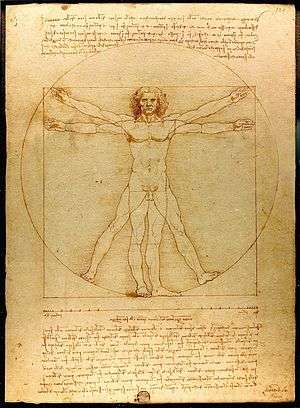
"The Vitruvian Man" by Leonardo da Vinci
Many Catholics, both clerics and laypersons alike, have made significant contributions to the development of science and mathematics from the Middle Ages to today. These scientists include Galileo Galilei,[1] René Descartes,[2] Nicolas Copernicus, Louis Pasteur,[3] Blaise Pascal, André-Marie Ampère, Gregor Mendel, Charles-Augustin de Coulomb, Pierre de Fermat, Antoine Laurent Lavoisier, Marin Mersenne, Alessandro Volta,[4] Augustin-Louis Cauchy, Pierre Duhem, Jean-Baptiste Dumas, Roger Boscovich,[5] Pierre Gassendi, and Georgius Agricola.
Catholic scientists

Saint Albert Magnus, a pioneer of biological field research
- Maria Gaetana Agnesi (1718–1799) – mathematician who wrote on differential and integral calculus
- Georgius Agricola (1494–1555) – father of mineralogy[6]
- Albertus Magnus (c.1206–1280) – patron saint of natural sciences
- André-Marie Ampère (1775–1836) – one of the main discoverers of electromagnetism
- Mariano Artigas (1938–2006) – Spanish physicist, philosopher and theologian who received the Templeton Foundation Prize in 1995
- Leopold Auenbrugger (1722–1809) – first to use percussion as a diagnostic technique in medicine
- Adrien Auzout (1622–1691) – astronomer who contributed to the development of the telescopic micrometer
- Amedeo Avogadro (1776–1856) – noted for contributions to molecular theory and Avogadro's Law
- Francisco J. Ayala (1934–present) – Spanish-American biologist and philosopher at the University of California, Irvine[7][8]
- Roger Bacon (c. 1214–1294) – Franciscan friar and early advocate of the scientific method
- Stephen M. Barr (1953–present) – professor in the Department of Physics and Astronomy at the University of Delaware and a member of its Bartol Research Institute
- Daniello Bartoli (1608–1685) – Jesuit priest and one of the first to see the equatorial belts of Jupiter
- Laura Bassi (1711–1778) – physicist at the University of Bologna and Chair in experimental physics at the Bologna Institute of Sciences, the first woman to be offered a professorship at a European university
- Antoine César Becquerel (1788–1878) – pioneer in the study of electric and luminescent phenomena
- Henri Becquerel (1852–1908) – awarded the Nobel Prize in physics for his co-discovery of radioactivity
- John Desmond Bernal (1901–1971) – British pioneer in X-ray crystallography in molecular biology[9][10]
- Claude Bernard (1813–1878) – physiologist who helped to apply scientific methodology to medicine
- Jacques Philippe Marie Binet (1786–1856) – mathematician known for Binet's formula and his contributions to number theory
- Jean-Baptiste Biot (1774–1862) – physicist who established the reality of meteorites and studied polarization of light
- Bernard Bolzano (1781–1848) – priest and mathematician who contributed to differentiation, the concept of infinity, and the binomial theorem
- Giovanni Alfonso Borelli (1608–1679) – often referred to as the father of modern biomechanics
- Roger Joseph Boscovich (1711–1787) – Jesuit priest and polymath known for his atomic theory and many other scientific contributions
- Raoul Bott (1923–2005) – mathematician known for numerous basic contributions to geometry in its broad sense[11][12]
- Thomas Bradwardine (c.1290–1349) – Archbishop and one of the discoverers of the mean speed theorem
- Louis Braille (1809–1852) – inventor of the Braille reading and writing system
- Edouard Branly (1844–1940) – inventor and physicist known for his involvement in wireless telegraphy and his invention of the Branly coherer
- Martin Stanislaus Brennan (1845–1927) – priest, astronomer and writer
- James Britten (1846–1924) – botanist, member of the Catholic Truth Society and Knight Commander of the Order of St. Gregory the Great[13]
- Hermann Brück (1905–2000) – Astronomer Royal for Scotland from 1957–1975; honored by Pope John Paul II
- Albert Brudzewski (c. 1445–c.1497) – first to state that the Moon moves in an ellipse
- Jean Buridan (c.1300–after 1358) – French priest who developed the theory of impetus
- Nicola Cabibbo (1935-2010): Italian physicist, discoverer of the universality of weak interactions (Cabibbo angle), President of the Pontifical Academy of Sciences from 1993 until his death
- Alexis Carrel (1873–1944) – awarded the Nobel Prize in Medicine for pioneering vascular suturing techniques
- John Casey (mathematician) (1820–1891) – Irish geometer known for Casey's theorem
- Giovanni Domenico Cassini (1625–1712) – first to observe four of Saturn's moons and the co-discoverer of the Great Red Spot on Jupiter
- Augustin-Louis Cauchy (1789–1857) – mathematician who was an early pioneer in analysis
- Bonaventura Cavalieri (1598–1647) – mathematician known for his work in optics and motion, calculus, and for introducing logarithms to Italy
- Andrea Cesalpino (c.1525–1603) – botanist who also theorized on the circulation of blood
- Jean-François Champollion (1790–1832) – published the first translation of the Rosetta Stone
- Guy de Chauliac (c.1300–1368) – the most eminent surgeon of the Middle Ages
- Albert Claude (1899–1983) – awarded the Nobel Prize in Medicine for his contributions to cytology
- Christopher Clavius (1538–1612) – Jesuit who was the main architect of the Gregorian calendar
- Mateo Realdo Colombo (1516–1559) – discovered the pulmonary circuit,[14] which paved the way for Harvey's discovery of circulation
- Carl Ferdinand Cori (1896–1984) – shared the 1947 Nobel Prize in Physiology or Medicine with his wife for their discovery of the Cori cycle
- Gerty Cori (1896–1957) – biochemist who was the first American woman win a Nobel Prize in science (1947)[15]
- Gaspard-Gustave Coriolis (1792–1843) – formulated laws regarding rotating systems, which later became known as the Corialis effect
- Charles-Augustin de Coulomb (1736–1806) – physicist known for developing Coulomb's law
- Nicolaus Copernicus (1473–1543) – first person to formulate a comprehensive heliocentric cosmology
- Johann Baptist Cysat (c.1587–1657) – Jesuit priest known for his study of comets
- René Descartes (1596–1650) – father of modern philosophy and analytic geometry
- Johann Peter Gustav Lejeune Dirichlet (1805–1859) – mathematicians who contributed to number theory and was one of the first to give the modern formal definition of a function
- Alberto Dou (1915–2009), Spanish Jesuit priest who was president of the Royal Society of Mathematics, member of the Royal Academy of Natural, Physical, and Exact Sciences, and one of the foremost mathematicians of his country
- Pierre Duhem (1861–1916) – historian of science who made important contributions to hydrodynamics, elasticity, and thermodynamics
- Jean-Baptiste Dumas (1800–1884) – chemist who established new values for the atomic mass of thirty elements
- John Eccles (1903–1997) – Awarded the Nobel Prize in Medicine for his work on the synapse[16]
- Stephan Endlicher (1804–1849) – botanist who formulated a major system of plant classification
- Gerhard Ertl (1936– ) – German physicist who won the 2007 Nobel Prize in Chemistry for his studies of chemical processes on solid surfaces[17]
- Bartolomeo Eustachi (c.1500–1574) – one of the founders of human anatomy
- Hieronymus Fabricius (1537–1619) – father of embryology
- Gabriele Falloppio (1523–1562) – pioneering Italian anatomist who studied the human ear and reproductive organs
- Mary Celine Fasenmyer (1906–1996) – Roman Catholic sister and mathematician, founder of Sister Celine's polynomials
- Hervé Faye (1814–1902) – astronomer whose discovery of the periodic comet 4P/Faye won him the 1844 Lalande Prize and membership in the French Academy of Sciences
- Pierre de Fermat (1601–1665) – number theorist who contributed to the early development of calculus
- Enrico Fermi (1901–1954) – awarded the Nobel Prize in physics for his work in induced radioactivity
- Jean Fernel (1497–1558) – physician who introduced the term physiology
- Fibonacci (c.1170–c.1250) – popularized Hindu-Arabic numerals in Europe and discovered the Fibonacci sequence
- Hippolyte Fizeau (1819–1896) – first person to determine experimentally the velocity of light[18]
- Léon Foucault (1819–1868) – invented the Foucault pendulum to measure the effect of the earth's rotation
- Joseph von Fraunhofer (1787–1826) – discovered Fraunhofer lines in the sun's spectrum
- Augustin-Jean Fresnel (1788–1827) – made significant contributions to the theory of wave optics
- Galileo Galilei (1564–1642) – father of modern science[19]
- Luigi Galvani (1737–1798) – formulated the theory of animal electricity
- William Gascoigne (1610–1644) – developed the first micrometer
- Pierre Gassendi (1592–1655) – French astronomer and mathematician who studied the transit of Mercury and named the aurora borealis
- Joseph Louis Gay-Lussac (1778–1850) – chemist known for two laws related to gases
- Riccardo Giacconi (1931– ) – Nobel Prize-winning astrophysicist who laid the foundations of X-ray astronomy
- Paula González (1932–present) – Roman Catholic sister and professor of biology
- Francesco Maria Grimaldi (1618–1663) – Jesuit who discovered the diffraction of light
- Robert Grosseteste (c.1175–1253) – called "the first man to write down a complete set of steps for performing a scientific experiment"[20]
- Peter Grünberg (1939– ) – German physicist, Nobel Prize in Physics laureate[21]
- Johannes Gutenberg (c.1398–1468) – inventor of the printing press
- Jean Baptiste Julien d'Omalius d'Halloy (1783–1875) – one of the pioneers of modern geology[22]
- John Harsanyi (1929–2000) – Hungarian-American economist and Nobel Memorial Prize in Economic Sciences winner[23]
- René Just Haüy (1743–1822) – priest and father of crystallography
- Eduard Heis (1806–1877) – astronomer who contributed the first true delineation of the Milky Way
- Jan Baptist van Helmont (1579–1644) – founder of pneumatic chemistry
- George de Hevesy (1885–1966) – Hungarian radiochemist and Nobel laureate[24]
- Charles Hermite (1822–1901) – mathematician who did research on number theory, quadratic forms, elliptic functions, and algebra
- John Philip Holland (1840–1914) – developed the first submarine to be formally commissioned by the US Navy
- Antoine Laurent de Jussieu (1748–1836) – first to propose a natural classification of flowering plants
- Mary Kenneth Keller (c.1914–1985) – Sister of Charity and first American woman to earn a PhD in computer science, helped develop BASIC
- Eusebio Kino (1645–1711) – Jesuit missionary and cartographer who drew maps based on his explorations, first showing that California was not an island as was then believed
- Athanasius Kircher (c.1601–1680) – Jesuit scholar, has been called "the last Renaissance man"
- Brian Kobilka (1955– ) – American Nobel Prize winning professor who teaches at Stanford University School of Medicine[25][26]
- Nicolas Louis de Lacaille (1713–1762) – French astronomer noted for cataloguing stars, nebulous objects, and constellations
- René Laennec (1781–1826) – physician who invented the stethoscope
- Joseph Louis Lagrange (1736–1813) – mathematician and astronomer known for Lagrangian points and Lagrangian mechanics
- Jean-Baptiste Lamarck (1744–1829) – French naturalist, biologist and academic whose theories on evolution preceded those of Darwin
- Johann von Lamont (1805–1879) – astronomer and physicist who studied the magnetism of the Earth and was the first to calculate the mass of Uranus
- Karl Landsteiner (1868–1943) – Nobel Prize winner who identified and classified the human blood types
- Pierre André Latreille (1762–1833) – pioneer in entomology
- Antoine Lavoisier (1743–1794) – father of modern chemistry[27]
- Jérôme Lejeune (1926–1994) – pediatrician and geneticist, best known for his discovery of the link of diseases to chromosome abnormalities
- Georges Lemaître (1894–1966) – father of the Big Bang theory[28]
- Marcello Malpighi (1628–1694) – father of comparative physiology[29]
- Étienne-Louis Malus (1775–1812) – discovered the polarization of light
- Anna Morandi Manzolini (1714–1774) – anatomist and anatomical wax artist who lectured at the University of Bologna
- Giovanni Manzolini (1700–1755) – anatomical wax artist and Professor of anatomy at the University of Bologna
- Guglielmo Marconi (1874–1937) – father of wireless technology and radio transmission
- Edme Mariotte (c.1620–1684) – priest who independently discovered Boyle's Law
- Pierre Louis Maupertuis (1698–1759) – known for the Maupertuis principle and for being the first president of the Berlin Academy of Science
- Gregor Mendel (1822–1884) – father of genetics
- Michele Mercati (1541–1593) – one of the first to recognize prehistoric stone tools as man-made
- Marin Mersenne (1588–1648) – father of acoustics and mathematician for whom Mersenne primes are named
- Charles W. Misner (1932–present) – American cosmologist dedicated to the study of general relativity
- Kenneth R. Miller (1948–present) – American cell biologist and molecular biologist who teaches at Brown University[30]
- Mario J. Molina (1943–present) – Mexican chemist, one of the precursors to the discovery of the Antarctic ozone hole (1995 Nobel Prize in Chemistry)
- Peter Joseph Moloney (1891–1989) – Canadian immunologist and pioneering vaccine researcher, who worked out the first large-scale purification of insulin in 1922; International Gairdner Award, 1967)[31]
- Gaspard Monge (1746–1818) – father of descriptive geometry
- John J. Montgomery (1858–1911) – American physicist and inventor of gliders and aerodynamics
- Giovanni Battista Morgagni (1682–1771) – father of modern anatomical pathology[32]
- Johannes Peter Müller (1801–1858) – founder of modern physiology[33]
- Joseph Murray (1919–2012) – Nobel Prize in Medicine laureate[34]
- John von Neumann (1903–1957) – Hungarian-born American mathematician and polymath[35] who converted to Catholicism[36]
- Jean-Antoine Nollet (1700–1770) – discovered the phenomenon of osmosis in natural membranes
- Martin Nowak (1965-present) – evolutionary theorist and Director of the Program for Evolutionary Dynamics at Harvard University.
- William of Ockham (c.1288–c.1348) – Franciscan friar known for Ockham's Razor
- Nicole Oresme (c.1320–1382) – 14th-century bishop who theorized the daily rotation of the earth on its axis
- Barnaba Oriani (1752–1832) – known for Oriani's theorem and for his research on Uranus
- Abraham Ortelius (1527–1598) – created the first modern atlas and theorized on continental drift
- Blaise Pascal (1623–1662) – French mathematician, physicist, inventor, writer and philosopher
- Louis Pasteur (1822–1895) – father of bacteriology[3][37]
- Nicolas-Claude Fabri de Peiresc (1580–1637) – discovered the Orion Nebula
- Max Perutz (1914–2002) – Austrian-born British molecular biologist, who shared the 1962 Nobel Prize for Chemistry[38][39][40]
- Georg von Peuerbach (1423–1461) – called the father of mathematical and observational astronomy in the West[41]
- Giuseppe Piazzi (1746–1826) – Theatine priest who discovered the asteroid Ceres and did important work cataloguing stars
- Jean Picard (1620–1682) – French priest and father of modern astronomy in France[42]
- John Polanyi (1929– ) – Canadian chemist, won the 1986 Nobel Prize for his research in chemical kinetics[43]
- Michael Polanyi (1891–1976) – Hungarian polymath, made contributions to physical chemistry, economics, and philosophy
- Vladimir Prelog (1906–1998) – Croatian-Swiss organic chemist, winner of the 1975 Nobel Prize for chemistry
- Santiago Ramón y Cajal (1852–1934) – awarded the Nobel Prize for his contributions to neuroscience
- René Antoine Ferchault de Réaumur (1683–1757) – scientific polymath known especially for his study of insects
- Francesco Redi (1626–1697) – his experiments with maggots were a major step in overturning the idea of spontaneous generation
- Henri Victor Regnault (1810–1878) – chemist with two laws governing the specific heat of gases named after him[44]
- Gregorio Ricci-Curbastro (1853–1925) – one of the founders of tensor calculus
- Giovanni Battista Riccioli (1598–1671) – Jesuit priest and the first person to measure the acceleration due to gravity of falling bodies
- Gilles de Roberval (1602–1675) – mathematician who studied the geometry of infinitesimals and was one of the founders of kinematic geometry
- Frederick Rossini (1899–1990) – Priestley Medal and Laetare Medal-winning chemist[45]
- Theodor Schwann (1810–1882) – founder of the theory of the cellular structure of animal organisms
- Angelo Secchi (1818–1878) – Jesuit priest who developed the first system of stellar classification
- Ignaz Semmelweis (1818–1865) – early pioneer of antiseptic procedures, discoverer of the cause of puerperal fever
- Domingo de Soto (1494–1560) – Spanish Dominican priest and professor at the University of Salamanca; in his commentaries to Aristotle he proposed that free falling bodies undergo constant acceleration
- Lazzaro Spallanzani (1729–1799) – priest and biologist who laid the groundwork for Pasteur's discoveries
- Nicolas Steno (1638–1686) – Bishop, father of stratigraphy
- Pierre Teilhard de Chardin (1881–1955), Jesuit priest, theologian and renowned paleontologist
- Francesco Lana de Terzi (1631–1687) – Jesuit priest who has been called the father of aeronautics
- Louis Jacques Thénard (1777–1857) – discovered hydrogen peroxide
- Theodoric of Freiberg (c.1250–c.1310) – gave the first geometrical analysis of the rainbow
- Evangelista Torricelli (1608–1647) – inventor of the barometer
- Paolo dal Pozzo Toscanelli (1397–1482) – Italian mathematician, astronomer and cosmographer
- Richard Towneley (1629–1707) – mathematician and astronomer whose work contributed to the formulation of Boyle's Law
- Louis René Tulasne (1815–1885) – biologist with several genera and species of fungi named after him
- Louis Nicolas Vauquelin (1763–1829) – discovered the chemical element beryllium
- Pierre Vernier (1580–1637) – mathematician who invented the Vernier scale
- Urbain Le Verrier (1811–1877) – mathematician who predicted the discovery of Neptune
- Andreas Vesalius (1514–1564) – father of modern human anatomy
- François Viète (1540–1603) – father of modern algebra[46]
- Leonardo da Vinci (1452–1519) – Renaissance anatomist, scientist, mathematician, and painter
- Vincenzo Viviani (1622–1703) – mathematician known for Viviani's theorem, Viviani's curve and his work in determining the speed of sound
- Alessandro Volta (1745–1827) – physicist known for the invention of the battery[4]
- Wilhelm Heinrich Waagen (1841–1900) – geologist and paleontologist
- Karl Weierstrass (1815–1897) – often called the father of modern analysis[47]
- E. T. Whittaker (1873–1956) – English mathematician who made contributions to applied mathematics and mathematical physics
- Johann Joachim Winckelmann (1717–1768) – one of the founders of scientific archaeology
- Bertram Windle (1858–1929) – anthropologist, physician, and former president of University College Cork
- Antonino Zichichi (1929– ) – Italian nuclear physicist, former President of the Istituto Nazionale di Fisica Nucleare[48][49]
See also
- Catholic Church and science
- Christianity and science
- List of Jesuit scientists
- List of Roman Catholic cleric–scientists
External links
References
- ↑ Stephen Hawking; A Brief History of Time, 1996; p. 194-195
- ↑ "René Descartes". Newadvent.org. Retrieved 30 May 2012.
...preferred to avoid all collision with ecclesiastical authority.
- 1 2 Vallery-Radot, Maurice (1994). Pasteur. Paris: Perrin. pp. 377–407.
- 1 2 "Gli scienziati cattolici che hanno fatto lItalia". Zenit.
- ↑ Pavle Knezović – Ruđer Bošković's songs on Virgin Mary, Obnovljeni život, Vol.50 No.5 Rujan 1995. http://hrcak.srce.hr/file/3574
- ↑ George Agricola
- ↑ "Evolution: Religion: Science and Faith". Pbs.org. Retrieved July 26, 2010.
- ↑ Dreifus, Claudia (April 27, 1999). "A CONVERSATION WITH: FRANCISCO J. AYALA; Ex-Priest Takes the Blasphemy Out of Evolution". New York Times. Retrieved April 24, 2009.
- ↑ Brown, Andrew (2005). J. D. Bernal: the sage of science. Oxford [Oxfordshire]: Oxford University Press. ISBN 0-19-851544-8.
- ↑ Brown 2005, pp. 1–3
- ↑ http://www-history.mcs.st-and.ac.uk/Biographies/Bott.html
- ↑ http://www.ams.org/notices/200605/fea-bott-2.pdf
- ↑
 Obituary: James Britten.
Obituary: James Britten. - ↑ Mateo Realdo Colombo
- ↑ http://www.csupomona.edu/~nova/scientists/articles/cori.html
- ↑ http://www.adherents.com/people/pe/John_Eccles.html John Eccles
- ↑ Weishaupt, Till (December 2007). "Glauben Sie an Gott?". Cicero. Retrieved 2008-06-05.
Translated from German: Oh, yes, I believe in God. (…) I am a Christian and I try to live as a Christian (…) I read the Bible very often and I try to understand it.
- ↑ Armand-Hippolyte-Louis Fizeau
- ↑ Sharratt (1994, pp. 17, 213)
- ↑ Woods, Thomas E. How the Catholic Church Built Western Civilization. Washington, DC: Regnery Pub., 2005. (p. 95–96)
- ↑ "Peter Grünberg – Autobiography".
- ↑ Jean-Baptiste-Julien D'Omalius Halloy
- ↑ http://www.nap.edu/html/biomems/jharsanyi.pdf
- ↑ Levi, Hilde (1985), George de Hevesy : life and work : a biography, Bristol: A. Hilger, p. 14, ISBN 978-0-85274-555-7
- ↑ http://www.catholicnews.com/data/briefs/cns/20121023.htm#head1
- ↑ http://www.austindiocese.org/newsletter_article_view.php?id=7177
- ↑ Antoine-Laurent Lavoisier
- ↑ A Science Odyssey: People and Discoveries: Big bang theory is introduced
- ↑ Marcello Malpighi
- ↑ http://research.brown.edu/pdf/1100924768.pdf?nocache=1322280569
- ↑ http://drpetermoloney.com
- ↑ Giovanni Battista Morgagni
- ↑ Johann Müller
- ↑ http://www.adherents.com/people/pm/Joseph_Murray.html
- ↑ Regis, Ed (1992-11-08). "Johnny Jiggles the Planet". The New York Times. Retrieved 2008-02-04.
- ↑ Halmos, P.R. (1973). "The Legend of von Neumann". The American Mathematical Monthly. 80 (4): 382–394. doi:10.2307/2319080. JSTOR 2319080.
- ↑ Louis Pasteur
- ↑ http://www.haaretz.com/news/features/this-day-in-jewish-history/this-day-in-jewish-history-death-of-a-nobel-chemist.premium-1.501731
- ↑ Dickerson, R. E. (2008). "Max Perutz and the secret of life, by Georgina Ferry". Protein Science : A Publication of the Protein Society. 17 (2): 377–379. doi:10.1110/ps.073363908. PMC 2222719
 .
. - ↑ "Max Perutz OM". The Daily Telegraph. London. February 7, 2002.
- ↑ George von Peuerbach
- ↑ Jean Picard
- ↑ Knepper, P. (2005). "Michael Polanyi and Jewish Identity". Philosophy of the Social Sciences. 35 (3): 263–293. doi:10.1177/0048393105277986.
- ↑ Henri Victor Regnault
- ↑ Eliel, Ernest L., Frederick Dominic Rossini, Biographical Memoirs, National Academy of Sciences.
- ↑ François Vieta, Seigneur de La Bigottière
- ↑ The Princeton Companion to Mathematics. Ed. Timothy Gowers. Princeton: Princeton University Press, 2008. (p.770).
- ↑ Official Biography of Zichichi at the Ettore Majorana Foundation
- ↑ Antonino Zichichi; Richard C. Ragaini; Ettore M (2001). International Seminar on Nuclear War and Planetary Emergencies: 25th session. p. 4. ISBN 9789812797001.
This article is issued from Wikipedia - version of the 10/31/2016. The text is available under the Creative Commons Attribution/Share Alike but additional terms may apply for the media files.
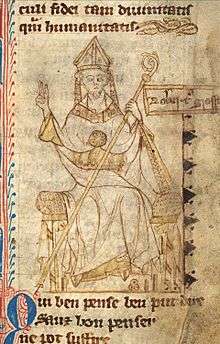



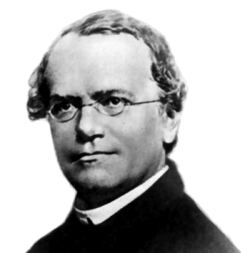


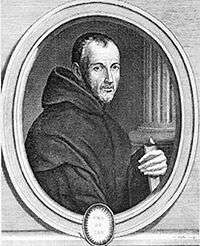




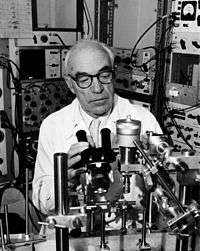
.jpg)